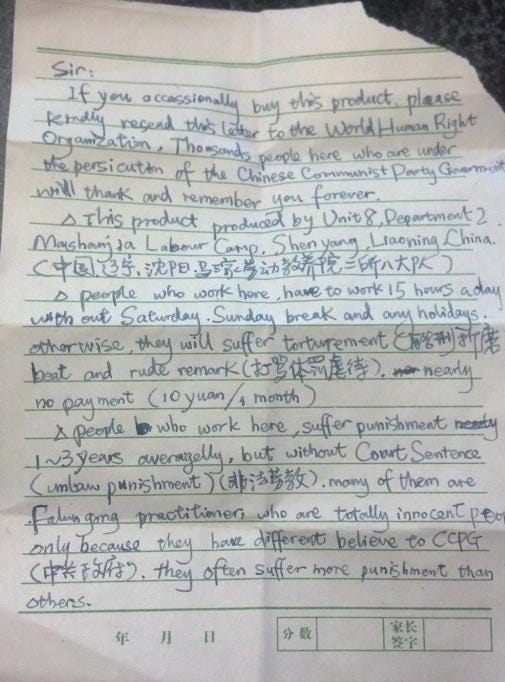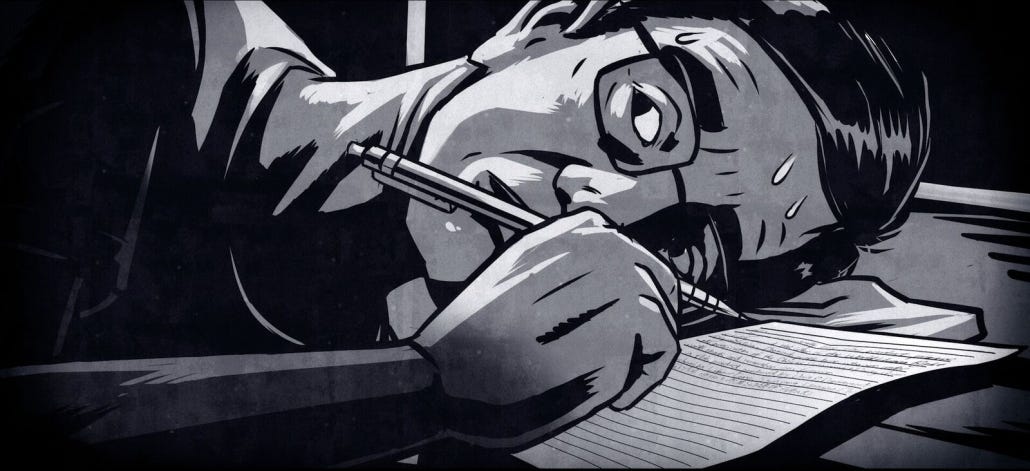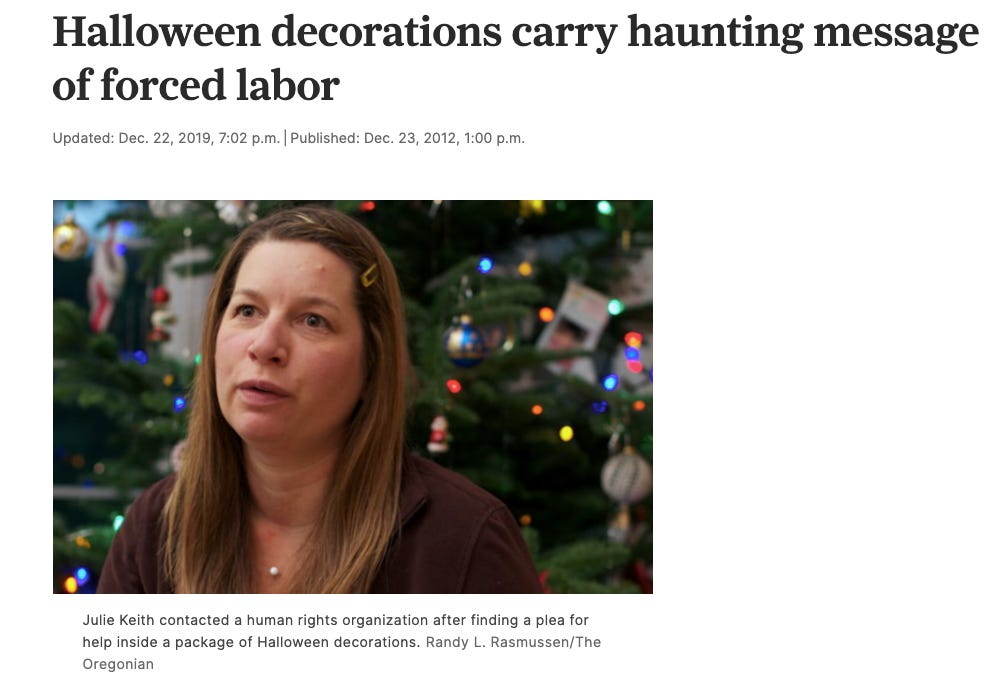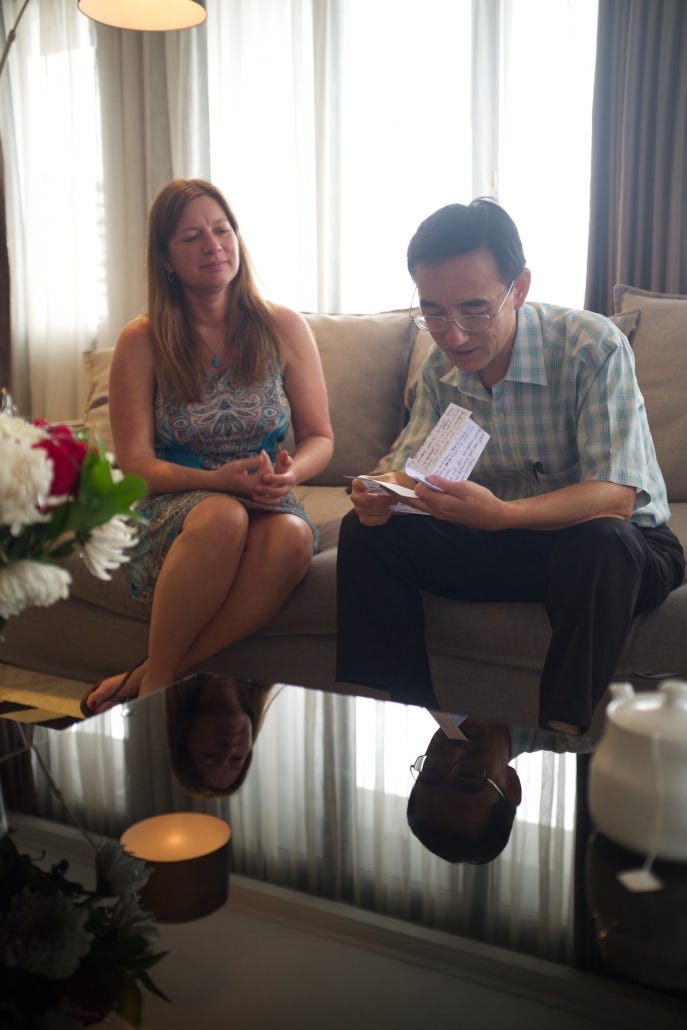#51: "People who work here suffer punishment"
the political prisoner's letter hidden inside a box of Halloween decorations
I’ve started another writing project.
You think I’d have learned by now; I’m always nose-deep in multiple projects, taking on another and another and another before coming to Rhody, my hair limp and my eyes ringed purple from fatigue, saying I somehow did it again.
How do you take on less? Anyone have advice on that? When a story grows inside me, I feel like nothing in the whole damn world can keep me from telling it, even if I’m already juggling another story (or two, or three) in various stages of completion.
This is all to say that I’ve got a new novel in the works, and am wielding all my inner resolve to keep from writing that instead of following through on obligations with deadlines, like a short story an editor asked for (! first time that’s happened), an art collaboration for a Photo Trouvée Magazine submission deadline, and a manuscript I’m editing for free as part of a charity auction (was that a mistake re: my time commitments? Yes. Yes it was.). That’s, of course, on top of my day job, this fine newsletter, and some intense chronic fatigue that’s had me falling asleep while eating lunch.
But we’re doing it, baby! And loving every dang second - especially Snail Mail Sweethearts. I’m so moved by turning history into accessible, fact-checked morsels like this one, and bringing them to life through visual art and flash fiction. The 24-hour news cycle has us always lurching ahead towards the next new thing, rather than glancing to the past - however recent that past may be - to learn about our world.
But not here. This week’s topic is the most recent yet, occurring a decade ago - and it’s one whose history impacts human rights and our shopping habits to this day.
I’m talking about the criminalization of the Falun Gong - and how China’s labor camps were exposed on the national stage because of one little letter found in Damascus, Oregon.
Today we’ll…
💌 learn about the mysterious letter in a Kmart Halloween Graveyard Kit,
💌 get to know the man brave enough to write it,
💌 dig into what the Falun Gong stand for,
💌 and maybe ponder what it means to be an empathetic human, even when faced with groups that hate you.

🪦 It all started with a styrofoam tombstone
(For this issue, most information has come from Letter from Masanjia, a 2018 documentary created by director Leon Lee and the letter’s author himself. Any information gleaned from elsewhere will be cited, but you may notice fewer footnotes than usual.)
In 2010, a woman named Julie went to an Oregon Kmart to prepare for Halloween. With three kids, one with a birthday coming up, she wanted to get spooky1. Among whatever other things a mom of three might buy at a Kmart, she added a 17-piece “Totally Ghoul” Graveyard Kit to the cart and called it a day.
But life being what life is, the kit was forgotten, ending up sitting in her garage unopened for two years. Before you judge, having kids seems hectic as hell, and in the U.S. - land of retail therapy and hyper-capitalism - a Garage of Unopened Shame isn’t as uncommon as you’d think.
So when her kid asked for a Halloween-themed birthday party in 2012, Julie recalled those tombstones from a few years prior, nabbed them from the garage, and brought them inside.
When she opened them, a letter tumbled out from between the slabs of styrofoam tombstones. Her daughter plucked it up and gave it to her mom.
Julie read the letter - and her whole life changed:

Sir:
If you occassionally buy this product, please kindly resend this letter to the World Human Right Organization. Thousands of people here who are under the persicution of the Chinese Communist Party Government will thank and remember you forever.
This product produced by Unit 8, Department 2, Mashanjia Labour Camp, Shenyang, Liaoning, China.
People who work here have to work 15 hours a day without Saturday, Sunday break and any holidays. Otherwise, they will suffer torturement, beat, and rude remark, and not nearly no payment (10 yuan/1 month2)
People who work here suffer punishment 1-3 years averagelly, but without Court Sentence (unlaw punishment). Many of them are Falun Gong practitioner, who are totally innocent people. Only because they have different believe to CCPG, they often suffer more punishment than others.
In such a convenience-oriented culture, Americans are quick to buy what’s easy, and are actively dissuaded from considering where their goods come from. Most Kmart or Wal-Mart shoppers are just regular folks looking to get their errands done.
But Julie couldn’t look away now - and was horrified. Confronted with the truth of what she’d bought, she took action, contacting Human Rights Watch immediately. But, perhaps due to bureaucracy at its finest, her appeal was met with crickets.
Desperate to help whoever wrote this letter, Julie contacted Oregon Customs, who the reached out to Kmart. Naturally, being the corporation it is, Kmart aggressively denied working with labor camps, providing this bullshit statement:
“Sears Holdings has a Global Compliance Program which helps to ensure that vendors and factories… adhere to specific Program Requirements… Failure to comply with any of the Program Requirements, including the use of forced labor, may result in a loss of business or factory termination. We understand the seriousness of this allegation, and will continue to investigate.”
And with that promise that maybe, perchance, proof of forced labor might translate to Kmart ending those business dealings - Julie reached another dead end.
But this letter had changed Julie; how could it not? Unsure where else to turn, Julie reached out to The Oregonian, a statewide newspaper, and on December 23, 2012, the news went public.
Overnight, what had been a months-long slog to gain traction unraveled into an avalanche that carried around the globe. The story went viral, and two years after the letter was written, it finally made international headlines.
🌏 Crossing firewalls to connect
Across the world, a man named Sun Yi logged onto his computer in China. He routinely bypassed the government’s firewalls to read Western news outlets. And that day, which must have felt like any other until that moment, the story gripping the world shocked him: a letter, found in a box of Halloween decorations.
A letter Sun Yi had written, himself.
Known by his family as a gentle, loving, and resilient man, Sun Yi had been out of prison for nearly two years when his plea finally garnered international attention. The labor camp, Masanjia, was alive and kicking, and this letter might finally put pressure on the government to shut it down.
Sun Yi was excited by the news - but nervous. His wife Fu Ning was frightened, too. Their past years together had been trying, peppered with government raids that endangered not only themselves, but their families as well.
By 2012, Sun Yi he’d already spent about 15 years practicing Falun Gong, a controversial yet widely adopted branch of qi gong outlawed by the People’s Republic of China since 1999. Sun Yi was no stranger to arrest; since Falun Gong’s illegalization, he’d been arrested or detained over a dozen times.
But Sun Yi believed in the Falun Gong’s spiritual teachings, and felt he’d become more compassionate through them. Fu Ning, who didn’t practice Falun Gong, agreed, saying this spiritual path turned him into a giving person, someone who helped strangers at any opportunity, often at his own expense.
🧘🏻 But who are the Falun Gong, really?
I’m forever wary of looking at another culture’s set of beliefs and saying I know what’s best, or that I understand every nuance to a degree that makes me worthy of giving my opinion.
But what I can say with confidence is that Falun Gong is a very conservative organized qi gong group. Some people call it a religion, others a cult, while the Falun Gong, naturally, reject both of those assessments. When it was outlawed in China, Falun Gong boasted 70-100 million practitioners in the country alone. Now, over 100 countries worldwide have Falun Gong branches.
If you think you’ve never heard of them before, I promise you that you have: Shen Yun, the big traditional Chinese dance revue that I swear I’ve seen a poster for in every city I’ve visited these past five years, is the Falun Gong’s cultural arm.
Their leader, Li Hongzhi, is viewed by core practitioners as a living deity who can prevent cancer and reverse greying hair3, among other things. The Falun Gong have some pretty buzzworthy beliefs baked into their core tenets of “Truthfulness, Compassion, and Tolerance,” including being anti-evolution, thinking interracial married couples will be separated in heaven, and homophobia4.
But as I researched, I couldn’t help but think the Falun Gong is no more or less problematic than many Christian groups in the US; their US-based international newspaper, The Epoch Times, spews garden-variety conservative viewpoints you might see in any town across the nation.
As a non-religious person, calling out Falun Gong’s moral hypocrisy but not Western Christianity’s does feel like a case of potato, potahto - one made more complicated by the fact that, like The New Yorker journalist Jia Tolentino points out, both Falun Gong and China largely speak to the public through propaganda.
But here’s the thing: if people from Westboro Baptist Church were in forced labor and “reeducation” camps, I’d advocate for their freedom. Modern slavery in all its forms is never the answer, even if we’re talking about people who hate us for our interracial relationships and queerness5. And before we get on our high horse about China’s labor camps, just remember that the US has for-profit prisons6 - and that the 13th Amendment of our constitution legalizes labor camps: “Neither slavery nor involuntary servitude, except as a punishment for crime whereof the party shall have been duly convicted, shall exist within the United States, or any place subject to their jurisdiction.”
Look, if we thought everyone who disagrees with our world views didn’t deserve basic human rights, then that would spell a world of trouble for anyone in my life who didn’t find Steve Buscemi sexy. Seeing as there are only five of us worldwide in the Buscemi Appreciation Club, I’ll hold onto my empathy, even towards people who disavow everything my life contains.
⬛️ Dark times in Masanjia
Despite the complicated tenets of Falun Gong, Sun Yi was giving and warm, a guy simply trying to share the kind of qi gong that made his life make sense to him. He routinely risked his safety to provide tech support to underground Falun Gong printing presses.
For years, his arrests and detainments were brief. But when a new law passed offering citizens 2000-5000 yuan7 for turning in Falun Gong practitioners, Sun Yi’s relative luck ran out.

In 2008, he was apprehended at a printing press raid. Without being able to contact his wife or family, Sun Yi was whisked away to Masanjia.
The labor camp was brutal. Prisoners slept 30-40 to a room, with guards routinely stalking the rows of beds to watch for any trouble. Prisoners were assigned different work groups with various grueling tasks.
Early on, Sun Yi knew there was one work group he didn’t want to be assigned to above all others: The Eighth Team, a group prisoners said were tortured to death. Sun Yi’s first sight of The Eighth Team was at night as they lugged bones across the prison yard.
But soon, his work assignment came - and much as Sun Yi wished it weren’t, he was enlisted to that very team. As a small mercy, the bones Sun Yi had seen them carrying weren’t human bones, but Halloween decorations, the kind that Julie in Oregon would one day buy.
Even so, the Eighth Team was brutal. Sun Yi’s job was hand-aging the styrofoam decorations by dipping them in black dye, then patting the paint away to give them an old effect. He worked from 4 a.m. til midnight doing the same repetitive dabbing motion for hours on end. When he did manage those few hours of sleep, Sun Yi said his hands would move of their own accord, aging styrofoam tombstones in his dreams.
Through it all, Sun Yi thought often of Fu Ning, the woman he loved, as a solace. But not long after joining the Eighth Team, he received one letter from home: Fu Ning was asking for a divorce.
It would be years until Sun Yi learned that Fu Ning had been detained and taken to a brainwashing center after his arrest. Scared for her own life and her family’s, she penned the request for a divorce to protect her loved ones.
But for Sun Yi, alone in Masanjia, the letter was all he knew. We don’t have a picture of it, but Sun Yi describes the letter with so much love, despite its contents. He read it constantly, he said, poring over each word, until the letter grew so thin at its seams, he feared it would tear. To preserve it, he covered the whole thing in tape. To him, this letter was proof that someone outside the prison walls existed who’d loved him.
With that buoy of hope - and maybe the knowledge of a letter’s power - Sun Yi held on. When a buyer came to Masanjia to check on his shipments, Sun Yi noticed that some of the boxes had English writing on them. Hoping that these would head overseas, Sun Yi embarked on a dangerous plan.
He stole some paper and a pen and got to work. At night, lying in bed and facing the wall, Sun Yi wrote as slowly as he could, careful not to make a sound. Working on his side in a foreign language made writing slow going, made more difficult by the wobbly mattress that served as his surface. Whenever the guards passed on their rounds, he’d freeze, pretending to be asleep.

They didn’t catch him. Over many nights, he wrote a handful of copies. And when they’d leave for the day, he’d slipped letters into boxes bound for English-language countries, then kept on writing at night, hoping to let the world know what was happening behind Masanjia’s tight walls.
❌ The Falun Gong “Re-education” unit
When a few other Falun Gong members got involved in smuggling letters, it wasn’t long before the guards caught wind of what was happening. The punishment was swift and horrible, and the Falun Gong prisoners were sent away to a special unit for forced “re-education.”
Re-education included brainwashing videos, but mostly, it was about torture. For an entire year, guards - usually inmate guards who were prisoners themselves - tortured Sun Yi every single day to force him to renounce his beliefs8. But despite the suffering, Sun Yi never wavered.
And finally, his sister enlisted the help of a human rights lawyer, and the government didn’t renew Sun Yi’s sentence. In 2010, he was released from Masanjia.
📹 Sun Yi braves sharing his story
Despite years passing since his release, Sun Yi’s letter was a (relative) success: in 2013, China closed down Masanjia and other labor camps, freeing 160,000 detainees. However, the change wasn’t perfect. Although the labor camps were closed, political dissidents like Sun Yi were now sent to brainwashing centers or prisons.
After his release, Sun Yi continued practicing Falun Gong and helping print literature. Routinely the target of raids and suspicion, he and Fu Ning reunited, but didn’t move in together until 2016 for fear of retribution. Around that time, Sun Yi was penning a memoir when film director Leon Lee contacted him about doing a documentary. Despite the risks, Sun Yi agreed, and Sun Yi was soon smuggling his camera around the country and capturing life as a Falun Gong practitioner in China.
While filming the documentary, he and Fu Ning decided to remarry and considered fleeing the country for political asylum. But as soon as they attempted to file the marriage paperwork, Fu Ning’s sister’s home was raided. Marrying Sun Yi and fleeing meant never seeing her family again - and putting them in danger. Fu Ning made one of the hardest decisions of her life:
She parted part ways with Sun Yi. With one small kiss goodbye, Sun Yi escaped to Jakarta alone.
Over the years, Julie had never forgotten about Sun Yi, and when he arrived in Jakarta, she reached out. She’d always worried sharing his letter had made things worse. And although they’d never met, they’d each changed each other’s lives; they had to meet.
She crossed the world and traveled to his Jakarta home. They talked about the letter and his experiences in prison, and he asked her what Halloween was like in the US, since it had been such a specter in his time at Masanjia. Their conversations were sweet, earnest, stilted - two people desperate to convey how much they mean to one another, despite the miles and language separating them.
After Julie left, the documentary showed Sun Yi crying in gratitude that she’d visited. “She feels like family,” he said.
It’s easy to see why: he endured torture and imprisonment, and upon release was forced to flee to a country where he knew nobody, couldn’t speak the language, couldn’t get a job, and was permanently separated from the love of his life. Julie’s arrival must’ve been a balm, reminding him that all his work and loss had meant something.
Just two months after Julie visited, Sun Yi died from acute kidney failure under mysterious circumstances; his family’s request for an investigation was denied.
And this entire story, we’d have known nothing about, if one brave man hadn’t risked his life to spread the word - and one woman hadn’t bought a random box of Halloween decorations from Kmart.
Til next time~
Nothing’s spookier than political suppression, my dudes - and that cuts both ways!
To leave you with some more soothing autumn feelings, here’s a composition for the season by Rhody that I can’t stop listening to:
All my love and international compassion forever,
Nikita, Your Snail Mail Sweetheart
(PS - thanks for bearing with the few-day delay for this month’s issue! Chronic fatigue ain’t no joke, my friends)
Can relate.
That’s USD $1.42, or €1.29 today. Per month.
“Master Li’s Brave New Age” by Anthony Spaeth for TIME Magazine, May 10th, 1999
The incredibly named “The Gods Hate Fags: Falun Gong’s Reactionary Social Teachings” by Zhang Xinzhang and James R. Lewis is a good reference.
If Rhody and I go to separate heavens (separate hells?), I’ll start an afterlife riot!!!
There are so many good articles on this, but sometimes the cold, hard Wikipedia truth does the job just fine. So does this song.
USD $282-$705, or €259-€647.
I won’t get into how he was tortured, but if you want to learn about it, I definitely recommend the documentary.









